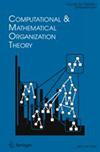Optimally Distinct? Understanding the motivation and ability of organizations to pursue optimal distinctiveness (or not)
IF 1.5
4区 管理学
Q3 COMPUTER SCIENCE, INTERDISCIPLINARY APPLICATIONS
Computational and Mathematical Organization Theory
Pub Date : 2022-01-01
DOI:10.1177/26317877221079341
引用次数: 6
Abstract
The question of how distinctive organizations should strive to be, compared to peers, has seen a resurgence of attention. A central focus in this stream of work has been on identifying optimal distinctiveness—distinctiveness that yields superior performance relative to peers. The resulting recommendation has been that organizations should strive to pursue such optimal distinctiveness. In this paper, we argue that organizations are neither equally motivated nor equally able to pursue optimal distinctiveness and explore the implications of variation in such motivation and ability. We focus on two questions, centered on (1) better understanding the extent to which organizations pursue optimal distinctiveness, for which we offer possible arguments based on four combinations of motivation and ability, and (2) the conditions that shape organizations’ ability and motivation to optimize their distinctiveness. We then offer a number of methodological suggestions that would support further inquiries into these questions and close by delineating a renewed research agenda for optimal distinctiveness.优化不同的吗?了解组织追求(或不追求)最佳独特性的动机和能力
与同行相比,组织应该如何与众不同,这个问题重新引起了人们的关注。这一工作流的中心焦点是确定最优的独特性——相对于同行产生卓越表现的独特性。由此产生的建议是,组织应该努力追求这种最佳的独特性。在本文中,我们认为组织既没有同等的动机也没有同等的能力去追求最优独特性,并探讨了这种动机和能力变化的含义。我们关注两个问题,主要集中在:(1)更好地理解组织追求最佳独特性的程度,为此我们基于动机和能力的四种组合提供了可能的论点,以及(2)形成组织优化其独特性的能力和动机的条件。然后,我们提供了一些方法学上的建议,这些建议将支持对这些问题的进一步调查,并通过描绘最佳独特性的新研究议程来结束。
本文章由计算机程序翻译,如有差异,请以英文原文为准。
求助全文
约1分钟内获得全文
求助全文
来源期刊

Computational and Mathematical Organization Theory
COMPUTER SCIENCE, INTERDISCIPLINARY APPLICATIONS-MATHEMATICS, INTERDISCIPLINARY APPLICATIONS
CiteScore
3.80
自引率
16.70%
发文量
14
审稿时长
>12 weeks
期刊介绍:
Computational and Mathematical Organization Theory provides an international forum for interdisciplinary research that combines computation, organizations and society. The goal is to advance the state of science in formal reasoning, analysis, and system building drawing on and encouraging advances in areas at the confluence of social networks, artificial intelligence, complexity, machine learning, sociology, business, political science, economics, and operations research. The papers in this journal will lead to the development of newtheories that explain and predict the behaviour of complex adaptive systems, new computational models and technologies that are responsible to society, business, policy, and law, new methods for integrating data, computational models, analysis and visualization techniques.
Various types of papers and underlying research are welcome. Papers presenting, validating, or applying models and/or computational techniques, new algorithms, dynamic metrics for networks and complex systems and papers comparing, contrasting and docking computational models are strongly encouraged. Both applied and theoretical work is strongly encouraged. The editors encourage theoretical research on fundamental principles of social behaviour such as coordination, cooperation, evolution, and destabilization. The editors encourage applied research representing actual organizational or policy problems that can be addressed using computational tools. Work related to fundamental concepts, corporate, military or intelligence issues are welcome.
 求助内容:
求助内容: 应助结果提醒方式:
应助结果提醒方式:


